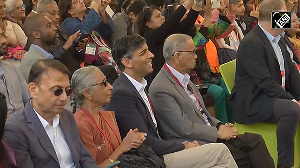In spite of strong objections from the Indian-American community, the government of India has abruptly introduced another set of rules for those who have taken up United States' citizenship.
The websites of the consulates have been publishing new rules and penalties almost every day without any advance notice.
It began with the rule that those applying for the Overseas Citizenship of India Card should renounce their Indian citizenship by paying $175 and obtaining a Surrender Certificate. They should produce their old passports (valid/expired) while doing so. That is in addition to the $275 for the OCI card.
Most Indian Americans branded it as a ploy to make an extra $175. More than the money, what irked most was the rule to obtain a surrender certificate in advance, which might take at least two weeks.
Renouncing the old passport could be done at the time of applying for the OCI card. The consulate could have asked for the old passports and issue a surrender certificate then. But as per the new rules, one has to renounce Indian citizenship within three months of taking up the citizenship of another country.
Many thought they could circumvent this rule by applying for a tourist visa to visit India, instead of an OCI card. But new rules for tourist visas state 'Persons of Indian Origin, his/her spouse and dependent children will be granted only an entry visa and should not apply for a tourist visa.'
To get an entry visa, one has to produce a surrender certificate by paying $175. For availing any consular service, the person of Indian origin needs the surrender certificate.
The embassy has also laid out fees and heavy penalties that will be clamped if the PIO doesn't renounce Indian citizenship.
The Indian Americans question the use of Section 8 of the Citizenship Act 1955 for the renunciation, as they point out that they are covered under Section 9.
"The provisions for termination of citizenship are separate and distinct from the provisions for making a declaration of renunciation. While, renunciation of citizenship is covered in Section 8 of the Citizenship Act 1955 and has to be applied on a prescribed form, automatic termination of citizenship is covered under Section 9 and requires no formal application to the Indian government," noted Inder Singh, chairman of Global Organisation of People of Indian Origin.
"Indians in the United States, who have acquired American citizenship, are covered under section 9 and not under Section 8," he said.
Section 8 of the Citizenship Act says, "Any citizen of India of full age and capacity, who is also a citizen or national of another country, makes in the prescribed manner a declaration renouncing his Indian citizenship, the declaration shall be registered by the prescribed authority; and, upon such registration, that person shall cease to be a citizen of India."
However, as per Section 9 of the same Act, "Any citizen of India who by naturalisation, registration or otherwise voluntarily acquires, or has at any time between the 26th January, 1950 and the commencement of this Act voluntarily acquired, the citizenship of another country shall, upon such acquisition or, as the case may be, such commencement, cease to be a citizen of India."
There are thousands of people who have obtained US citizenship in the last sixty years. They have been traveling to India on an American passport and Indian visa granted by the same consulates whose websites have new rules which are applicable retroactively, Singh noted.
"The requirement of surrendering their Indian passports after the lapse of many years of their naturalization would cause undue hardship and delay in getting consular services," he said.
John Titus, president of the Federation of Malayalee Associations, said the rules will only alienate the community and used to harass the people.
"The babus in the bureaucracy look at the NRI with contempt and the bill is another example of it. For 175 dollars, they are creating heartaches among the people," said Paul Karukappilli, president of the Federation of Kerala Associations in North America.







 © 2025
© 2025